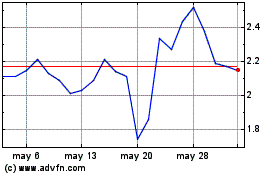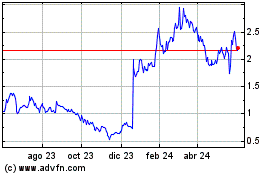Compugen Discloses Splice Variant Based Program to Discover Superior Oncology Drug Targets for mAb Therapy
27 Abril 2011 - 6:00AM
Business Wire
Compugen Ltd. (NASDAQ: CGEN) announced today that it is
utilizing its proprietary in silico human transcriptome and
proteome and additional computational systems to discover splice
variants of known drug targets of high industry interest and of
other known proteins with potential to become cancer targets for
mAb therapy. This program has resulted so far in the discovery of
four novel splice variant proteins predicted to be superior
oncology targets compared with the previously known proteins. These
four splice variants have entered Compugen’s Pipeline Program and
are at various stages of validation.
Compugen’s proprietary in silico transcriptome and proteome
infrastructure is the result of its decade-long research and
modeling of various biological phenomena, including alternative
splicing, resulting in a rich, comprehensive, and broadly
applicable discovery infrastructure consisting of all genes and
their respective splice variants and resulting proteins. In this
program, Compugen is utilizing this proprietary knowledge database,
together with additional discovery systems and tools, to discover
novel splice variants that can serve as superior mAb targets.
Dr. Zurit Levine, Compugen’s VP of R&D, stated, “We first
selected a list of known proteins and drug targets that meet
industry therapeutic criteria. Challenging traditional experimental
discovery methods, we then utilized our in silico predictive human
transcriptome and proteome, and additional proprietary discovery
tools, to systematically discover previously unknown splice
variants, which, although expressed by the same genes as the known
proteins, have a unique epitope within their extracellular region
which would allow the development of specific mAbs. Next, we tested
their predicted expression, function and certain other properties
compared with the known proteins. For example, several of these
candidate targets exhibited a potential unique expression pattern,
while others exhibited a potential superiority in their functional
or structural characteristics. To date, this process has resulted
in four candidate targets with predicted superiority compared with
the existing proteins.”
Dr. Levine continued, “Including this splice variant program, we
are now discovering potential targets for monoclonal antibodies and
other therapeutic approaches through the use of four distinct but
mutually supporting programs. The other three target discovery
programs are based on sophisticated expression analysis utilizing
our unique MED Platform and its new field extension modules, new
protein family members, and, at an earlier stage of capability
development, functional prediction. With respect to mAb therapy,
these four approaches facilitate discovery of candidate targets
applicable for various mAb technologies, such as antibody-drug
conjugates (ADCs), and enhanced antibody dependent cell mediated
cytotoxicity (enhanced ADCC).”
Dr. Anat Cohen-Dayag, president & CEO of Compugen, added,
“This is an excellent example of how we can utilize our proprietary
predictive biology infrastructure on a ‘market-need’ driven basis
to quickly identify in silico discoveries in areas of high industry
interest that have eluded traditional experimentally based
approaches. It took more than a decade of pioneering the
understanding of key life processes at the molecular level, such as
alternative splicing, to create the core of this infrastructure,
but it is now proving to be a valuable and unique resource for
systematic therapeutic and diagnostic product candidate
discovery.”
About Alternative Splicing
mRNA transcripts are produced from the genome by a process of
transcription and splicing, in which the exons of the gene are
derived from the genome and connected to create the resulting
transcript. Alternative splicing is a phenomena that occurs when
various different exon combinations are possible, thus resulting in
multiple mRNA transcripts originating from the same gene. These
different mRNA transcripts are translated into multiple possible
protein isoforms which may have similar or different functions. The
combinatorial nature of alternative splicing enables the genome to
produce numerous transcripts from a relatively small number of
genes, allowing a more varied proteome.
For more than a decade, Compugen has been a pioneer and
continues to be a world leader in understanding the alternative
splicing of genes and predicting the resulting combination of exons
leading to the formation of splice variants that are probable to
occur in nature. One of Compugen’s first breakthroughs in the
deeper understanding of biological phenomena at the molecular level
was its prediction regarding the high prevalence of alternative
splicing. This prediction, that alternative splicing is the norm
rather than the exception, was later confirmed by the Human Genome
Project and following works, which resulted in the understanding
that fewer genes exist in the human genome than previously
believed.
About Compugen
Compugen is a leading drug and diagnostic discovery company
providing novel product candidates addressing important unmet
therapeutic and diagnostic needs to pharmaceutical, biotech and
diagnostic companies under milestone and royalty bearing or other
revenue sharing agreements. Unlike traditional high throughput
trial and error experimental based discovery, Compugen's discovery
efforts consist of in silico (by computer) hypothesis-driven
product candidate prediction and selection followed by in vitro and
in vivo experimental validation. Compugen's unique in silico
prediction and selection capabilities are based on a broad and
continuously growing infrastructure of proprietary scientific
understandings and predictive platforms, algorithms, machine
learning systems and other computational biology tools. Industry
collaborations may be entered into before product candidate
discovery is undertaken pursuant to "discovery on demand" type
arrangements, or with respect to existing product candidates, can
be initiated prior to, or at the proof of concept stage, or after
selected preclinical activities have been undertaken by Compugen.
In 2002, Compugen established an affiliate, Evogene Ltd.
(www.evogene.com) (TASE:EVGN.TA), to utilize certain of the
Company's in silico predictive discovery capabilities in
agricultural biotechnology. For additional information, please
visit Compugen's corporate website at www.cgen.com.
This press release may contain "forward-looking statements"
within the meaning of the Private Securities Litigation Reform Act
of 1995. These statements include words such as "may," "expects,"
"anticipates," "believes," and "intends," and describe opinions
about future events. These forward-looking statements involve known
and unknown risks and uncertainties that may cause the actual
results, performance or achievements of Compugen to be materially
different from any future results, performance or achievements
expressed or implied by such forward-looking statements. Some of
these risks are: changes in relationships with collaborators; the
impact of competitive products and technological changes; risks
relating to the development of new products; and the ability to
implement technological improvements. These and other factors are
identified and more fully explained under the heading "Risk
Factors" in Compugen's annual reports filed with the Securities and
Exchange Commission.
Compugen (NASDAQ:CGEN)
Gráfica de Acción Histórica
De Jul 2024 a Ago 2024

Compugen (NASDAQ:CGEN)
Gráfica de Acción Histórica
De Ago 2023 a Ago 2024
